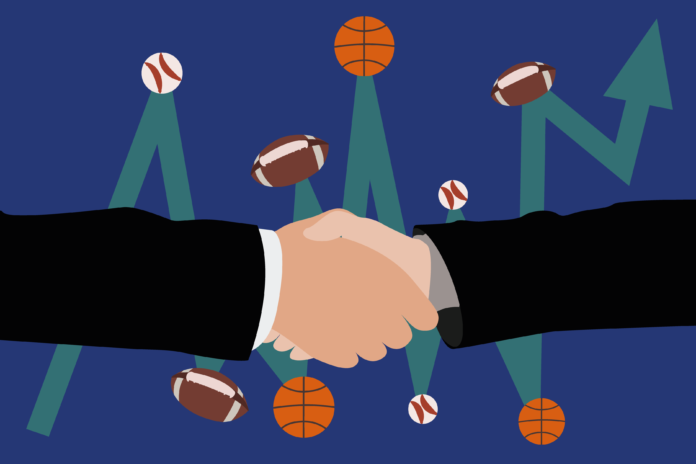Insider knowledge is like insider trading and ruins the integrity of sports
By ALEX MOTAWI — almotawi@ucdavis.edu
Gambling on sports has been around for ages. Many baseball fans know of the Black Sox Scandal (where the White Sox intentionally lost games in the World Series to help gamblers back in 1919), and many U.S. sports fans have heard about former professional baseball player and manager Pete Rose’s lifetime ban for betting on his own games as a manager, which was handed out in 1985. U.S. sports have had a rocky history with sports betting, and we are quickly entering an era that may be the worst yet, as far as betting is concerned. With betting coming back in force due to a 2018 Supreme Court decision, conflict of interest problems are springing up everywhere. Sports owners and reporters gain too much of a betting advantage, so they shouldn’t be allowed to affiliate with betting sites.
The rise in betting began in 2018 when the Professional and Amateur Sports Protection Act (PAPSA) was repealed by the Supreme Court. The PAPSA was a rule instated in 1992 (not long after the Pete Rose ban) that banned most states from legalizing sports gambling. It was repealed on the grounds that regulated sports betting is a great avenue for states to recoup funds through taxes, and it paved the way for states to legalize sports betting. Now that states have had time to legalize betting, a litany of services have sprouted out from the woodworks, entering U.S. sports betting into a golden age. With both sports leagues and the government strapped for cash, greedy owners and politicians have turned to betting as the solution.
In California, we could have an opportunity to vote in 2022 to decide whether to join the 33 states who have legalized sports betting. As of now, the only way to bet on sports in California is through online sites located in other countries, so legalization could lead to better regulatory practices even though it brings up a whole host of other issues.
One of these issues is that sports insiders like owners or reporters can abuse their status to sway the odds in favor of their betting companies. While at face value it may seem like a small issue, small issues add up when money is at stake. It needs to be looked at and stopped, and the leagues in question (primarily the NFL) are probably not going to do anything about it unless forced. Team owners have the power to steer the league and its policies and are not going to willingly give up their ownership in these betting companies primed to balloon over the coming years without a push. Even if you do not believe in sports betting as an institution, anyone can recognize an unfair deal and make the conscious choice to help others.
There are many reasons why this is a dangerous conflict of interest. Pre-game, a team is given 75% odds to win the game. Only the team owner knows that the team’s star player is going to be out sick. They can then set the odds to reflect a 65% chance of the team winning. This will lead the bettors to bet heavily on the win at 65% odds because they will receive a better payout. Now the betting line has a lot of money on the team winning because the public sees the inaccurate 75% odds. However, because the star is not playing, the true odds of the team winning is more like 25%. The team starts the game without its star, loses the game and the site profits big time as it used its inside influence to motivate bettors to bet for the wrong result on the site. It’s a complicated example because sports betting is a complicated endeavor, and it is definitively not fair.
Power like that, even if it only affects a fraction of the games, adds up quickly to large amounts of money pilfered from the pockets of bettors playing an unfair game. It fills the coffers of the company and scams the bettors. It is no different from the concept of insider trading in the stock market, and the stock market works to prevent insider trading and levies heavy punishments for people caught.
If sports betting is going to be commonplace and government endorsed in California — and the entire U.S for that matter — it needs to be regulated. Team owners, reporters, players and everyone else with insider information need to sell their stakes in betting companies and find something else to do with their large heaps of money. I would recommend tackling homelessness or world hunger, but that’s just me. It’s the only way to make the system fair and let gamblers bet away their money on sports on an equal playing field. We need to push the leagues and our government to enforce more regulation on these conflicts of interest — it’s only fair.
Written by: Alex Motawi — almotawi@ucdavis.edu
Disclaimer: The views and opinions expressed by individual columnists belong to the columnists alone and do not necessarily indicate the views and opinions held by The California Aggie.




